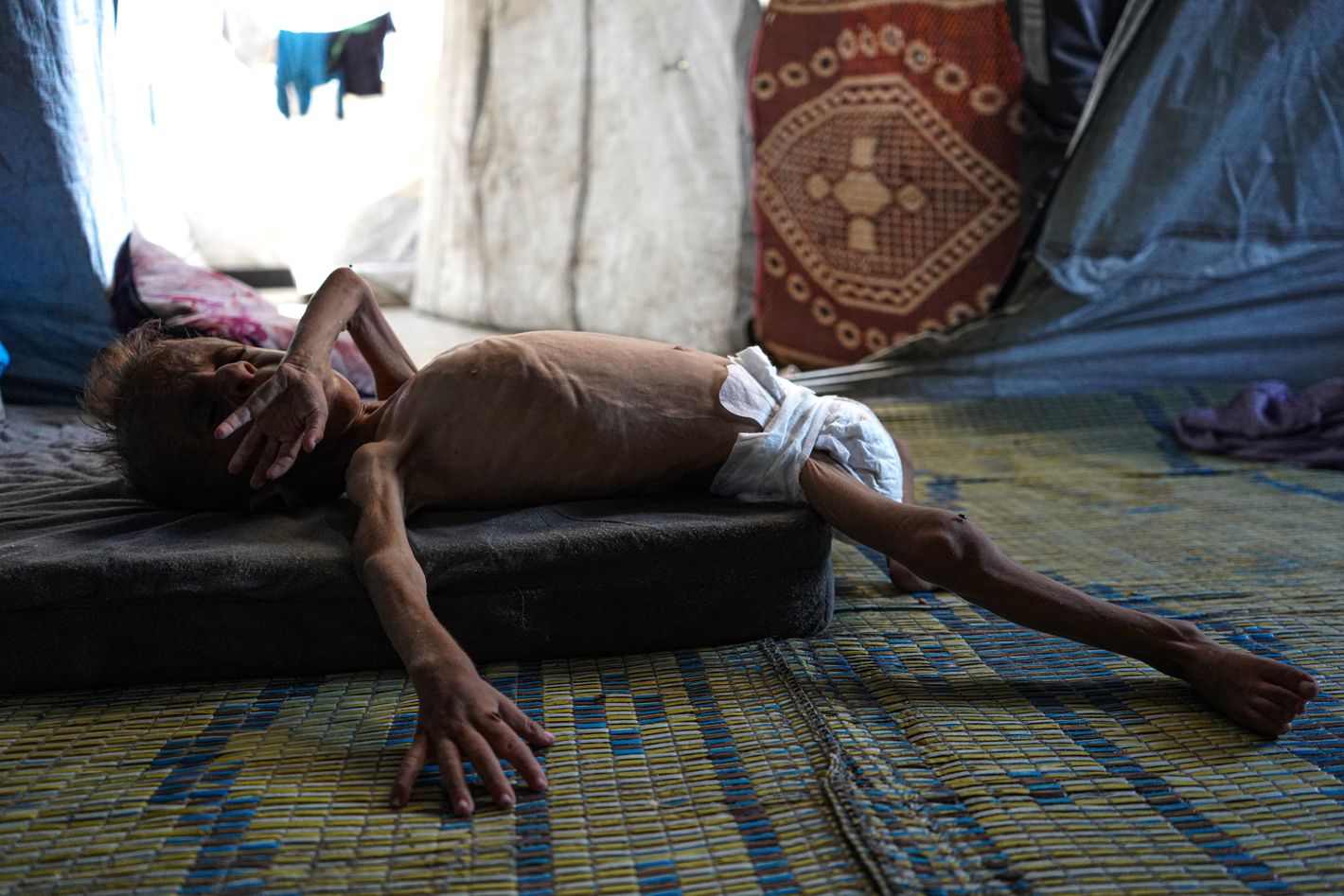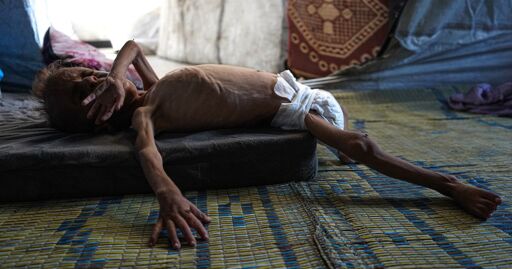 Photo: Anas Zeyad Fteha/Anadolu/Getty Images
Photo: Anas Zeyad Fteha/Anadolu/Getty Images
Israel is starving the people of Gaza, and a few individuals in power have decided they care — with caveats. At the New York Times, columnist Ross Douthat admits that “Israel’s warmaking at this moment is unjust,” though not before he blames Hamas alone for a “willingness to accept famine” and for thwarting a cease-fire. In Douthat’s world, the government of Prime Minister Benjamin Netanyahu bears no responsibility for either outcome; it’s as if the famine had sprung out of a void. Barack Obama posted on X that “aid must be permitted to reach people in Gaza,” an impersonal plea addressed to no one in particular. Hillary Clinton said much the same, posting, “The full flow of humanitarian assistance must be restored immediately.” Others were a little sharper. Senator Amy Klobuchar applauded Netanyahu when he spoke to Congress last year. Now she says that she met with him in July to argue for more aid and the end of Palestinian “displacement,” though she “never got a good answer.”
The price of flour is so high in Gaza that even the Free Press almost seems concerned. Although it declared the famine a “myth” in May, a new piece says that “a real hunger crisis” could happen — a tiny crack in a forbidding edifice. The website was founded by Bari Weiss, who got her start by falsely accusing Columbia University professors of antisemitic bias, and its content is uniformly Zionist. If the Free Press concedes reality, in some small and reluctant manner, then professional opinion is shifting indeed — but to what extent, and toward what end, is still unclear. Empathy of the Free Press is limited by ideological contortions: A “hunger crisis,” as the right-wing author Amit Segal put it, could be real, someday, but the “propaganda spouting out of the United Nations and Al Jazeera” is not. Who is to blame for the famine then? Certainly not Israel.
And yet there is no way to reckon with Gaza without implicating the Israeli government. Israel is blocking food and medicine to millions, and Israeli officials are denying it. There is no famine, they insist — the U.N. is lying; the press is lying; Palestinians are lying. They’ve blamed Hamas for stealing aid from the U.N., but according to Douthat’s employer, the Israeli military has found no evidence that this is true. When aid does make it into Gaza, Palestinians are risking their lives to acquire it. The U.N. Human Rights Office says that Israeli forces have shot and killed over 1,000 Gazan aid-seekers since May. Israel has killed 18,500 children in Gaza in their homes, schools, hospitals, and houses of worship; at least 900 were younger than 1. How many dead children is too many to bear? Now we know. There’s a number, an invisible line that Israel has possibly crossed.
On X, Tommy Vietor, who worked for the Obama White House and co-founded Crooked Media, urged the left to show a little patience to new critics of Israel. “The coalition to end this nightmare has to be big enough to include the anti-interventionist right & a liberal zionist who decided today that it has to end,” he posted. “No one wants to be part of a movement where self-righteous people scold them upon entry!” Accept Democrats like Klobuchar now, and vote them out later, he added. There’s a place for pragmatism, I don’t deny that, but I don’t see how that coalition can function, either — not without “scolding,” or righteous fury, or something like accountability. At minimum, the suddenly horrified should answer a few questions. For some, the dam broke open only last week, when the Times ran a photo of a starving child in Gaza, his ribs and spine protruding from his wasted body. But images like it have been circulating in public for a long time and not just on social media. Why did this child matter and not 6-year-old Hind Rajab, shot to death inside a car? Why care now and not last year, when The New Yorker ran a feature on the child amputees? Human-rights groups said that Israel started wiping out entire families in Gaza within days of the October 7 attack. Did they all deserve to die?
Go back to May 2020, when Israel held nearly 200 Palestinian children in various prisons and detention centers. Did they belong there? Minors incarcerated in Israel’s military justice system have reported physical abuse for years and are often interrogated without a parent or legal counsel. Is that a marker of a healthy democracy? Or go back to Operation Cast Lead in 2008: Hamas rockets killed 13 Israelis; Israel would eventually kill 1,417 Palestinians, including 313 children. An independent fact-finding mission, organized by the U.N. and headed by jurist Richard Goldstone, reported that Israeli forces shot at civilians under white flags not once but seven times. Was that justified? Did it destroy Hamas? During the same operation, Israel deployed white phosphorus near a school, and a market, and a hospital despite the dangers and the stipulations of international law.
Those who criticize Israel only today, and only for starving children and not for what many scholars are calling a genocide, have one more question to answer: What next? A cease-fire would save lives in the immediate term, but there is a future beyond it, and it is not worth much if Israel gets impunity now. The horror is not limited to Gaza. In the West Bank, fanatical settlers are stealing land and killing Palestinians like Odeh Hathaleen, a teacher who worked on the Oscar-winning film No Other Land. Netanyahu is facing a corruption trial, and his government’s planned judicial overhaul threatens what’s left of Israeli civil society. Atrocity has a lineage; it does not spring forth from the void. The only way to prevent bloodshed from happening again is to address it at the root — or at least make it more difficult to commit. If Gaza’s dead children matter at last, the U.S. cannot go on as it has done. There must be no more arms to Israel or funding for its operations. Treat it like the pariah state it strives to be. A coalition of the concerned won’t accomplish much unless it agrees on real consequences for mass murder, whether the perpetrator is Hamas or the Israeli government. “I cannot defend the indefensible,” Senator Angus King said last week. That’s a decent start. It can’t be the end.
From Intelligencer - Daily News, Politics, Business, and Tech via this RSS feed

